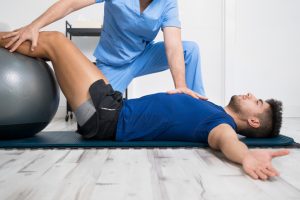Near Southampton Township, NJ, Breakthru Physical Therapy – Medford is here to improve and restore gait to promote overall mobility and independence. Gait abnormalities can arise from various causes, such as injuries, neurological conditions, or age-related changes. Our physical therapists are dedicated to addressing these challenges, utilizing specialized techniques to enhance the quality of life for their patients through improved gait and mobility.
What is Gait & Why is it Important?
 Gait, or how you walk, is a complex process involving coordination between the brain, muscles, and joints. It’s a fundamental aspect of movement that affects daily activities and overall health. Problems with gait can lead to a decreased ability to perform everyday tasks, an increased risk of falls, and a reduction in independence.
Gait, or how you walk, is a complex process involving coordination between the brain, muscles, and joints. It’s a fundamental aspect of movement that affects daily activities and overall health. Problems with gait can lead to a decreased ability to perform everyday tasks, an increased risk of falls, and a reduction in independence.
Here are 10 common signs of gait abnormalities:
- Uneven Stride Length: One of the most noticeable symptoms is an uneven stride, where one step is significantly longer or shorter than the other.
- Limping: Limping or favoring one leg over the other while walking is common and often indicates pain or weakness in one of the legs.
- Foot Dragging: Dragging one or both feet while walking, often scraping the toe, can indicate a problem with gait. This is sometimes seen in conditions like stroke or peripheral neuropathy.
- Waddling Gait: A waddling gait is characterized by a side-to-side walking motion and suggests muscle weakness in the hips or pelvic girdle.
- Stiffness: Noticeable stiffness in movement, especially in the legs, can lead to an abnormal gait and may be observed in conditions like arthritis or Parkinson’s disease.
- Balance Issues: Difficulty maintaining balance while walking, including frequent stumbling or falls.
- Reduced Speed or Difficulty Initiating Movement: Noticeably reduced walking speed or difficulty starting to walk.
- Altered Arm Swing: An abnormal or absent arm swing on one or both sides while walking.
- Change in Posture: Changes in posture, such as leaning forward or backward more than usual while walking.
- Pain: Pain in the legs, feet, or back during walking can lead to changes in gait as the body tries to minimize discomfort.
Physical Therapy for Gait Rehabilitation
Breakthru physical therapists use various techniques to assess and treat gait disorders. The process typically involves:
- Gait Analysis: This initial assessment helps identify specific gait abnormalities. Therapists use observations and technological tools to evaluate the pattern, rhythm, and symmetry of walking.
- Strength and Flexibility Training: Targeted exercises to strengthen weak muscles and stretch tight ones help contribute to a more balanced and efficient gait.
- Balance Training: Improving balance is crucial for a stable gait, especially in older adults or those who have suffered injuries. Therapists use exercises and balance activities to enhance stability.
- Joint Mobilization: In cases where joint stiffness contributes to gait problems, therapists may use techniques to increase joint mobility and flexibility.
- Walking Aids and Assistive Device Training: For some, walking aids like canes or walkers are necessary. Physical therapists ensure proper selection and training in their use, enhancing safety and independence.
- Neuromuscular Re-education: For patients with neurological conditions, retraining the nervous system to improve coordination and motor control is an essential part of therapy.
Get Back on Track
For Southampton Township, NJ, residents struggling with gait issues, Breakthru Physical Therapy in Medford is here to help address gait disorders, enhance mobility, and improve overall quality of life. Our dedicated physical therapists are equipped with the knowledge, skills, and compassion to guide patients through gait rehabilitation. Schedule an appointment online or call us at 609.793.8900 to get started today!
